Iranian Security Official In Qatar To Deepen Ties
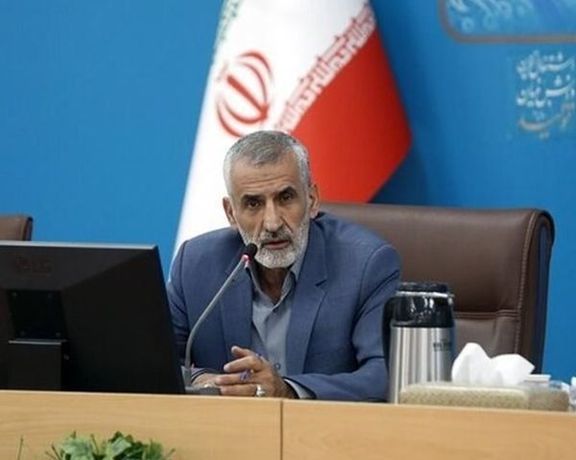
Iran's Deputy Interior Minister Majid Mirahmadi has held talks with Qatari officials in Doha to expand security cooperation between the two countries.

Iran's Deputy Interior Minister Majid Mirahmadi has held talks with Qatari officials in Doha to expand security cooperation between the two countries.
According to the IRGC-affiliated Fars News Agency, the two sides discussed security and law enforcement cooperation and holding of a joint security commission in Iran.
The release of Iranian fishermen and their boats, which Iran claims had entered the waters of Qatar due to ignorance of border limits, was raised, and the Qatari side agreed to their release. Bilateral solutions to tackling drug smuggling in the area were also discussed.
Iran and Qatar signed several bilateral deals last year during a visit by Iranian President Ebrahim Raisi to Doha to attend the Gas Exporting Countries Forum. Raisi's visit was the first to Qatar by an Iranian president in 11 years.
Qatar has strong ties with Iran, with which it shares a giant gas field. Tehran supported Doha after Saudi Arabia and its Arab allies imposed a boycott on Qatar in mid-2017 in a dispute over its links with Islamist groups and with non-Arab Turkey and Iran.
Recent restoration of diplomatic relations between Saudi Arabia and Iran signaled a new policy by the Persian Gulf Sunni Arab states for closer regional cooperation.
A deal brokered by China in March ended a diplomatic rift between Iran and Saudi Arabia, and re-established relations following years of hostility.

As tensions continue in the Persian Gulf, an IRGC commander claims the US feels the IRGC's naval authority in the region, including the trouble stricken Strait of Hormuz.
Admiral Alireza Tangsiri, the commander of IRGC navy, made the comments on Tuesday during a ceremony in the southern Khuzestan province.
“We, the soldiers of the Revolutionary Guards, perform our duty to defend the nation of Islamic Iran till the last drop of our blood,” he said.
His statements were made after senior officials from 22 nations and the GCC held a multilateral meeting in Bahrain this week to discuss the current maritime security environment and ways to further enhance that in the region which has seen numerous incidents as Iran flexes its muscles in one of the world's busiest shipping lanes.
After the meeting in Bahrain, the Spokesman of the US State Department, Matthew Miller said in a tweet on Tuesday that “the United States and like minded partners in the Middle East and from around the world are committed to enhancing maritime security in across the Middle East region and ensuring freedom of navigation through the region’s vital waterways.”
Earlier this month, the US Navy reported that Iranian military speed boats were "harassing" a commercial vessel in the Strait of Hormuz. The IRGC claimed to have assisted the vessel.
Iran has hundreds of fast attack boats that for years not only have harassed civilian vessels but, on many occasions, have come dangerously close to US and other warships in a show of force.
Iranian attacks on cargo vessels in the Strait of Hormuz, the shipping lane that carries about a fifth of the world’s oil, have increased over recent years and raised tensions between the US and Iran, in addition to other Western and Persian Gulf nations.
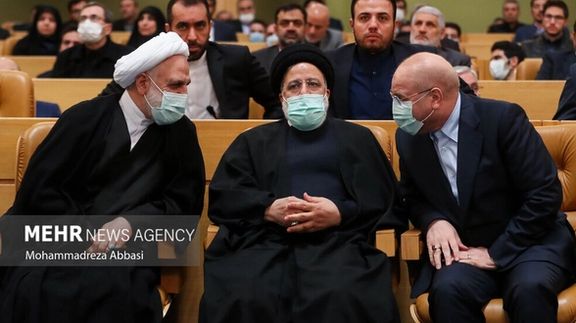
A former senior intelligence official and a founder of the ministry of intelligence, says Iran was once a semi-democracy but it has turned into a non-democracy.
Saeed Hajjarian, known as the most senior theoretician of reforms in Iran has said in an interview with reformist daily Etemad that “the sooner the Iranian government resigns the better.” He added that “the presence of this government and the school of thought it represents is a major loss for the nation.”
He said: “I am not suggesting that [President Ebrahim] Raisi should be replaced by a reformist figure. What I am suggesting is that the same conservatives at the Majles and in the government should sit together and think of an efficient replacement.”
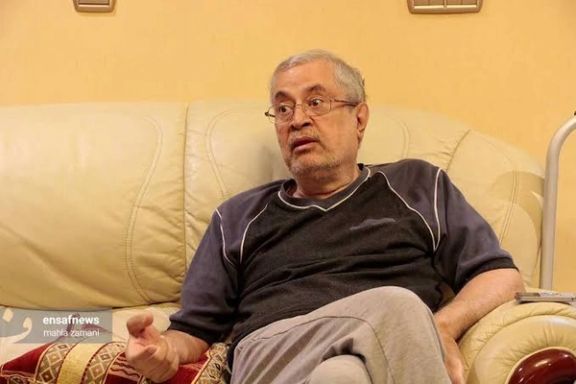
Hardliners loyal to Supreme Leader Ali Khamenei have pushed reformists out of the parliament (Majles) and the presidency since 2020, monopolizing all political power. However, as Iran’s economic situation has worsened partly because of US sanctions, reformists have become more vocal, demanding a chance to return to government positions.
“The Iranian opposition groups outside Iran are preoccupied with themselves. Instead of thinking of being an alternative to the current government, they are fighting with each other. On the other hand, they have been far from Iran for a long time and do not know the country’s problems, so their rhetoric sounds irrelevant,” he claimed.
While there have been disagreements among opposition activists, many in Iran still expect solutions from their compatriots who can freely engage in politics in Western countries.
In fact, some opposition figures, such as exiled Prince Reza Pahlavi have notable following in Iran, although there are no reliable polls to judge the exact measure of his popularity.
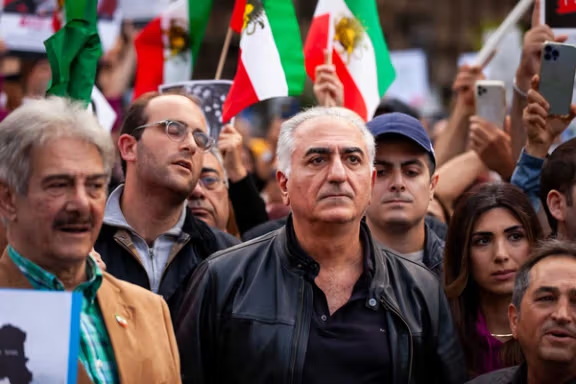
As a key political figure who for the first time spoke about an alternative to the current political system, Hajjarian pointed out that the only choice is “absolute republicanism” with no adjective to characterize it.
“I believe we cannot vote for an absolute monarchy or a hereditary form of succession or an Islamic Emirate. All of these are against the international human rights charter,” he claimed, ignoring the fact that many democratic countries are constitutional monarchies. He further pointed out that a benevolent dictatorship is like a poison for Iranians.
As a regime insider, it is not surprising that the former intelligence officer spoke against monarchy at a time when many Iranians look back with nostalgia to the pre-1979 period under the Pahlavi dynasty.
Hajjarian also failed to mention that the Islamic Republic is based on the unquestionable rule of a cleric, the Supreme Leader. Also, the republicanism he is advocating is impossible to establish within the current Islamic constitution, which reserves the final say to the Supreme Leader.
In another part of the interview, Hajjarian characterized the government of former President Mahmoud Ahmadinejad as “rich populism” and described the Raisi administration as a populist government that does not have money.
He said some of the outstanding problems in Iran such as the crisis of the pension fund and discrimination against women can create a political tremor and the government knows that it is incapable of coping with them.
Hajjarian said that borderlines between reformism and other political groups are blurred and most of those known as reformists are pseudo-reformists who are simply trying to find a way out of the current impasse.
Nevertheless, he argued that reformists are the only group with a plan, while critics say that they were in power for 16 years in the past 26 years and were not able to change the nature of the regime.
The former intelligence officer said Iran is in a state of suspension. If the situation worsens and the economic pressures become unbearable, Iran might show more flexibility toward the West.
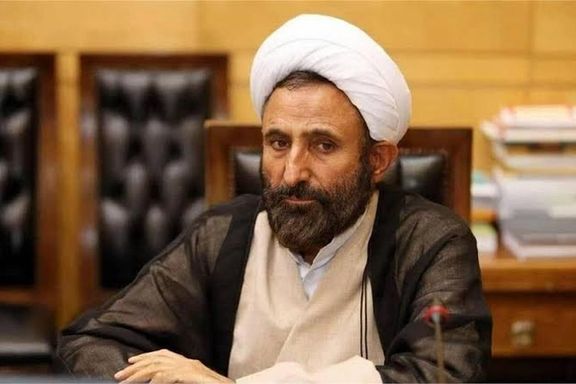
An Iranian legislator says the country’s parliament is obeying the Supreme Leader and will carry out his orders.
Hossein Jalali made the claim on Tuesday while lawmakers are supposed to represent the people and not to be under the thumb of Supreme Leader Ali Khamenei.
Jalali’s statement is not news to most Iranians who over the years have witnessed numerous times how the legislature follows directives from Khamenei’s office on key issues.
The member of the cultural commission of the parliament further defended the performance of the 11th Islamic parliament saying although there were some mistakes, the overall performance of the current Iranian legislature was acceptable.
In recent months many commentators in Iran have slammed the hardliner-dominated parliament for being ineffective both in terms of legislation to help the economy and also for being weak in demanding accountability from the government.
Last month, Iran’s Supreme Leader Ali Khamenei praised the country’s “revolutionary parliament” for passing a bill in 2020 that complicated nuclear negotiations.
“From the beginning of this parliament [2020], based on information I had, I believed that it is a revolutionary parliament, and now after three years I reiterate that,” Khamenei told 290 members of the legislature.
The current parliament was elected in February 2020 in a controversial vote when the Guardian Council, loyal to Khamenei, banned hundreds of relatively moderate candidates and allowed hardliners to gain a strong majority in the legislature.

Saudi Arabian Oil Company and TotalEnergies have signed an $11 billion contract to build a petrochemicals complex near an offshore field shared by Iran, which is under US sanctions and isolated.
The joint offshore field -- called Arash in Iran and Durra by Saudi Arabia and Kuwait -- was discovered in 1967 and is estimated to have a total proven reserves of around 310 million barrels of oil and 20 trillion cubic feet of gas. Iran claims any development without its consent breaks international laws, 40 percent of the field located in its territorial waters.
Saudi Aramco Gulf Operations Company signed a Memorandum of Understanding in December with Kuwait Gulf Oil Company (KGOC) to develop the joint Durra gas field, Saudi state news agency (SPA) reported.
The development aims at producing 1 billion cubic feet of gas and 84,000 barrels of liquefied gas per day, according to the Kuwaiti state news agency.
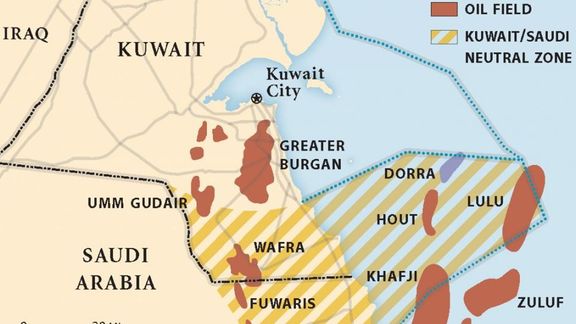
The $11 billion "Amiral" complex, a future world-scale petrochemicals facility expansion at the SATORP refinery in the city of Jubail in the kingdom's Eastern Province, is the latest announcement which will likely irk Iran.
Criticizing the Iranian government’s inaction vis-a-vis the project, Chairman of the Board of Directors of the Association of Iranian Oil and Gas Drilling Companies Hedayatollah Khademi told ILNA on Sunday, “It seems that we have surrendered the joint fields to the neighbors.”
Highlighting the fact that Riyadh has significantly developed and extracted from joint fields such as Arash/Durra, Farzad-A, Farzad-B, and Forouzan despite the fact that Iran dug the first exploratory wells in the fields. “We have not done anything," he said, accusing the regime of sitting idle in the face of the encroachment.
In March last year, Kuwait and Saudi Arabia started projects to extract gas from the field. Iran's foreign ministry spokesman at the time, Saeed Khatibzadeh said that as Iran has a share in the field it must be included in any action to operate and develop it. "The Arash/Al-Durra gas field is a joint field between Iran, Kuwait and Saudi Arabia. Parts of it are located in areas between Iran and Kuwait whose water boundaries have not been defined,” he said.
The new deal, which had been wrangled over by Aramco and TotalEnergies since 2018, will enable the Saudi Arabia and Kuwait not only to extract from the field but also process the gas and condensates to petrochemical products, which yield even higher profit, a kick in the teeth for the regime which only this year signed a detente with Saudi to resume diplomatic ties.

In 2001, Iran launched projects to extract gas from the field, but Kuwait threatened to file lawsuits at international bodies. The projects stopped after the Emir of Kuwait traveled to Iran and met with the then president Mohammad Khatami. In 2013, Iran announced that projects were restarted but they produced no results.
Integrated with the existing Saudi Aramco Total Refining and Petrochemical (SATORP) refinery in Jubail, the ‘Amiral’ complex will house the largest mixed-load steam cracker in the Persian Gulf region, with a capacity to produce 1.65 million tons of ethylene and other industrial gases annually.
The project, whose commercial operation is targeted to start in 2027, is expected to attract more than $4 billion in additional investment in a variety of industrial sectors and create about 7,000 jobs directly and indirectly in Saudi Arabia.
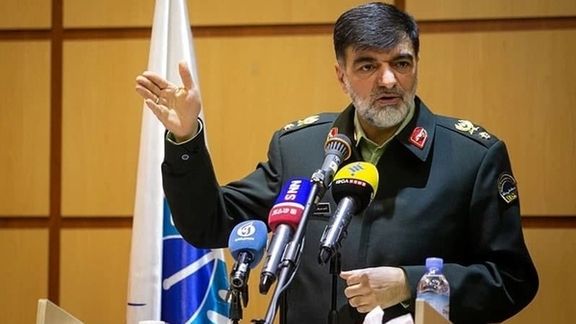
Iran’s infamous police chief Ahmad-Reza Radan will visit Russia to enhance cooperation between law enforcement entities of the two countries.
Iran’s Police Information Center announced on Monday that the brigadier general will meet his Russian counterparts to discuss "a range of issues."
A memorandum of understanding on bilateral cooperation in combating terrorism, human trafficking, and narcotics will be signed during his trip, Iranian local media reported.
Islamic Republic's Supreme Leader Ali Khamenei appointed Ahmadreza Radan as Iran's police chief in January after four months of popular anti-regime protests.
With Radan's track record as the heavy-handed former police chief of Greater Tehran, Kordestan and Sistan-Baluchistan provinces the appointment was immediately questioned by many Iranians on social media and by foreign-based Persian media.
Most of Radan's ill reputation dates back to his role as police chief during the post-election unrest in 2009 and the performance of his men at the Kahrizak detention center where several young protesters including children of some state officials were killed as a result of police brutality.
Radan's men were also seen in police vehicles running over protesters in the streets of Tehran on several occasions in 2009 and 2010. There is also a famous audio recording posted on social media in which Radan is ordering his men in Tehran to shoot anyone they can among protesters.
Radan was sanctioned for his human rights violations by the United States as early as 2010 and has been blacklisted by the European Union.